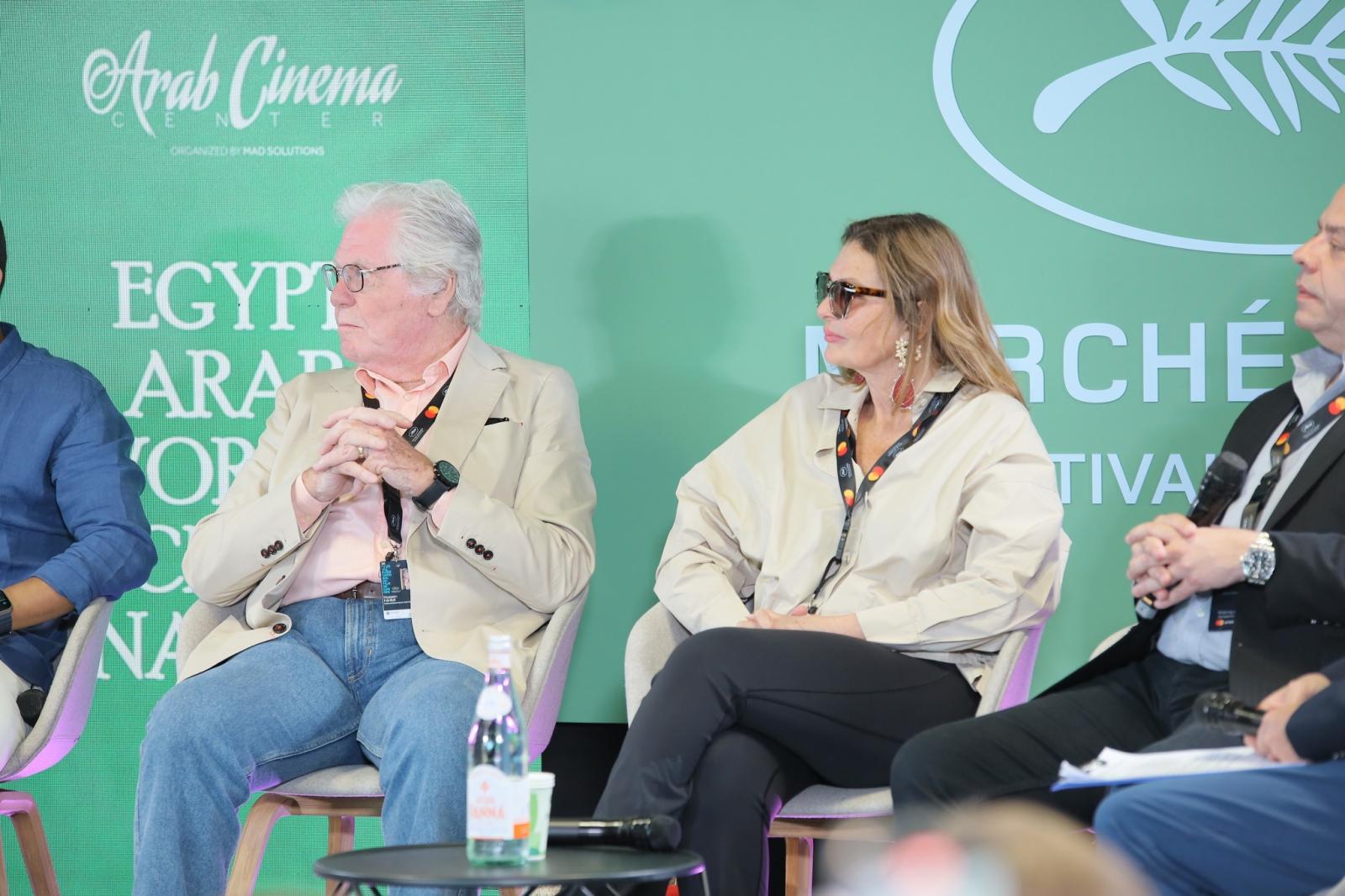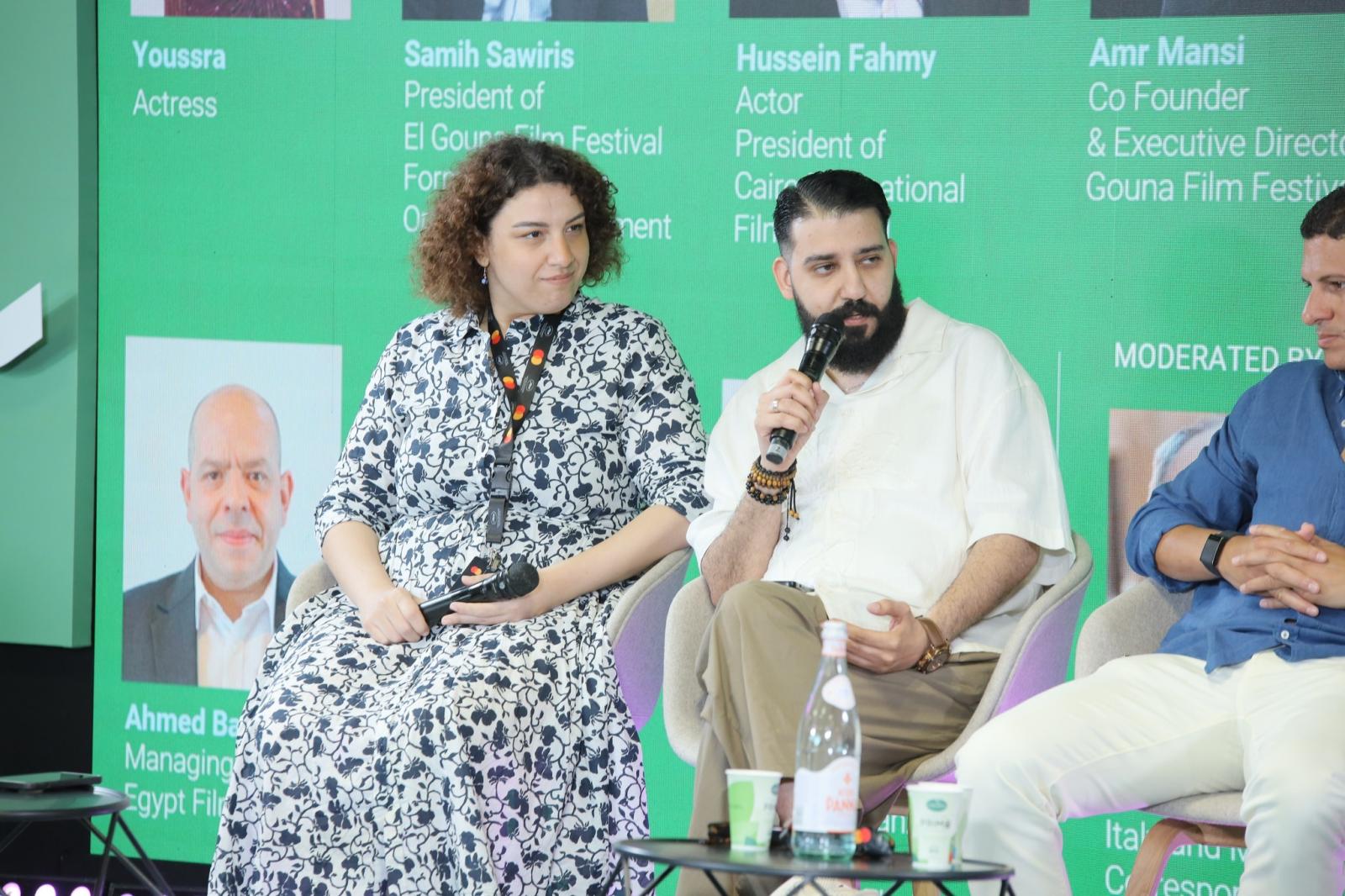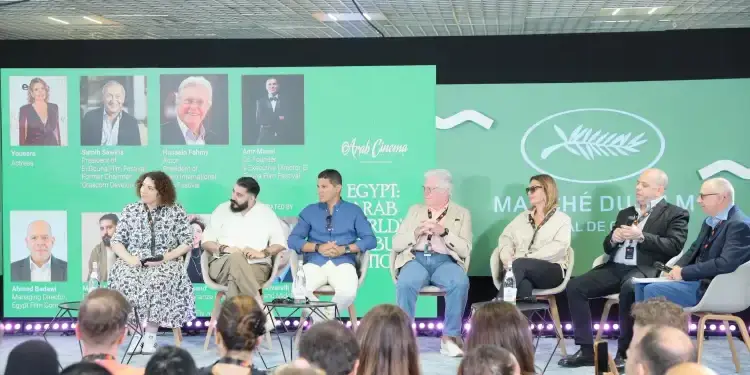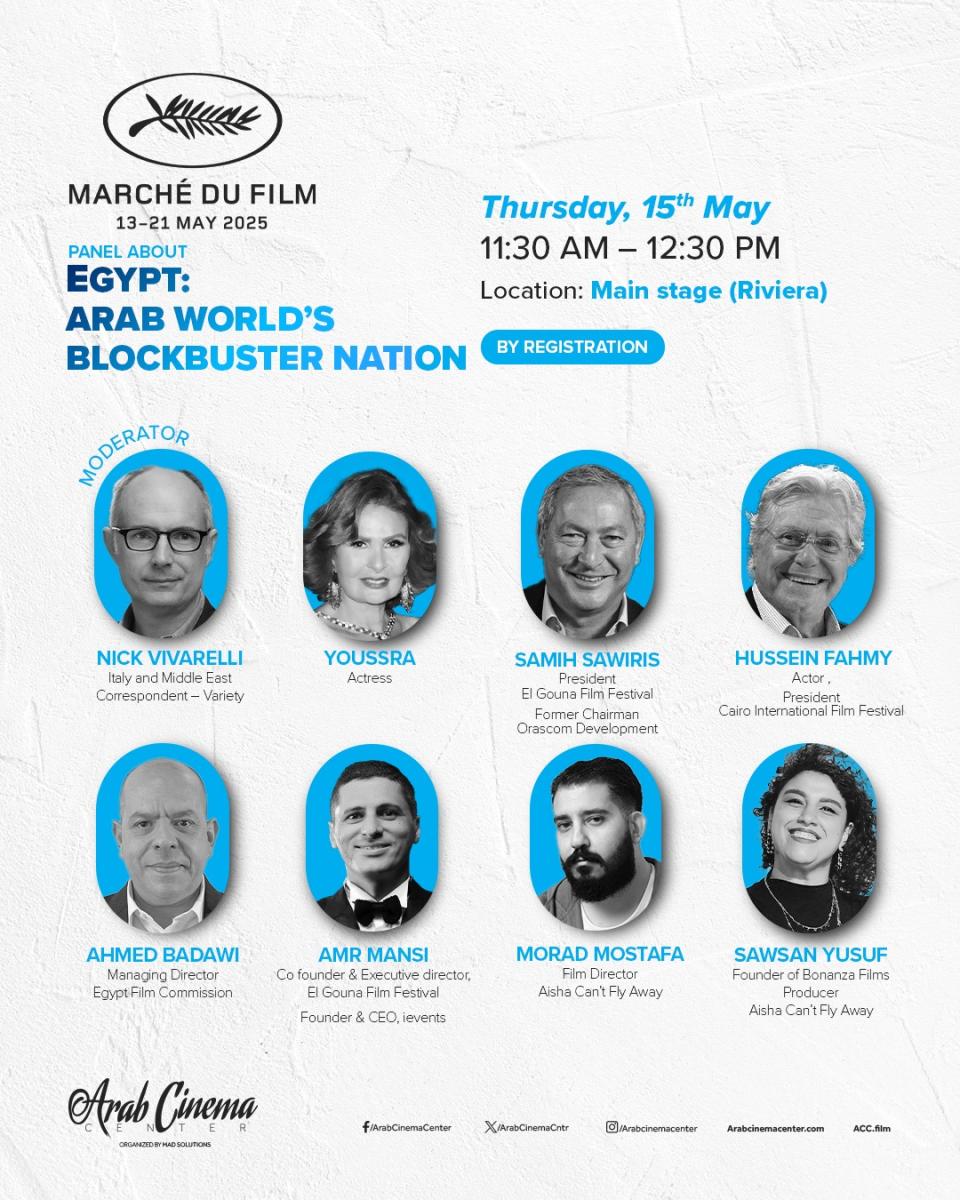On the occasion of the 78ᵉ Cannes Film Festival, the Arab Cinema Center organized A panel at the Palais des Festivals and Congresses, entitled “Egypt, flagship nation of Arab cinema”as part of its many activities aimed at highlighting the cinematographic dynamics of the region. Moderate by Nick Vivarelli, correspondent for Italy and the Middle East in Varietythis meeting has gathered several emblematic figures of contemporary Egyptian cinema, around the historical place and the future of this major cinematography in the Arab world: the legendary actress Yousra, actor Hussein Fahmy, young director Morad Mostafa, the leader of Egypt Film Commission Ahmed Badawi, producer Sawsan Yusuf, and the cultural entrepreneur Mansi. All of them have sketched, each in their own way, a living fresco of Egyptian cinema, between heritage and renewal.
The panel was opened with a recall of what was the golden age of Egyptian cinema, presented as a founding base for the whole Arab film industry. A brief historical overview made it possible to underline the precursor role of Egypt in the production, distribution and artistic training from the beginning of the 20th century, when its studios, its stars and its writers made Cairo the Hollywood of the Arab world. This introduction laid down the foundations for dialogue, anchoring exchanges in the long term of a heritage as prestigious as they are complex.
Yousra: a generational voice between glorious past and modern shocks
Upon her speaking, Yousra spoke of the audacity as an engine of artistic renewal. For her, if Egypt has long been the beating heart of Arab cinema, it now has vitality fueled by its ability to face sensitive subjects. “We still have the courage to talk about all subjects”, She said, claiming a desire to break taboos in her artistic choices. She proudly evokes her latest film, directed by a young filmmaker, whom she describes as “Shock” : A work designed to awaken an audience too absorbed by screens and social networks. “My movie is out of the box”, She insisted, confident in the ability of cinema to provoke awareness.
For me, this assertion that Egyptian cinema could today address all subjects remains questionable. It is actually very difficult, at present, to deal with certain sensitive themes in the Egyptian context, not only because of institutional censorship, but also because of growing conservatism and the pressure exerted by society. In Egypt, anyone can, in fact, file a complaint against a film or a work deemed contrary to morality, good manners or religion. The freedom of Egyptian cinema, especially at the time of Youssef Chahine or even until the 1990s, seems far away. On the other hand, on the formal level, Yousra is right: many young filmmakers dare today new, offbeat, sometimes radical approaches. The film Feathers From Omar El Zohairy, presented at the Critics Week in 2021, is a strong example, By its absurd tone and its critical gaze, which nevertheless encountered a lively controversy in Egypt and which was not distributed there, despite the prices collected internationally.
Yousra also underlined the unique relationship between Egyptian stars with their audience. This attachment, which she describes as “An unconditional love”rests, according to her, on duration, confidence and ability to surprise. She says he is proud to have been a benchmark for new generations of artists, noting that “90 % of current young artists worked with it at their beginnings”.
Finally, she paid tribute to Youssef Chahine, of which she was one of the Muses. Youssef Chahine, she recalls, “Wanted to show our cinema to the whole world” and has multiplied the participations in Cannes. But if the next generation is trying to follow her steps today, Yousra recognizes him with lucidity: “It is very insufficient. »»
Hussein Fahmy: living memory of Egyptian cinema and presidential commitment
The actor Hussein Fahmy, now president of the Cairo International Film Festival (CIFF), has delivered an intervention imbued with a deep attachment to the history of the seventh Egyptian art. “Egyptian cinema has existed since the invention of cinema, from the Lumière brothers”, he recalled, claiming uninterrupted artistic continuity.
Trained at the staging, he first achieved before becoming an actor, convinced that “It is the star who transmits, who is loved by the public”.
As president of the CIFF, he defended the idea of competition as an artistic stimulant. He believes that the rivalry with the El Gouna film festival is beneficial: “It pushes us to stay young, to keep a young spirit … It boosts us. »» He notably insisted on the efforts made to attract youth to the CIFF, by taking out the festival of his traditional places such as the Cairo Opera and going to the cinemas of the City of Cairo and suburbs, and by offering prices accessible to students. This desire for openness goes hand in hand with a public renewal strategy.
But Hussein Fahmy also expressed reserves on unrivaled competitions between festivals in the region. He regrets a disorganized form of competition, linked to the proximity of dates: “We are fighting to see the same films, to have the best juries, it raises the prices … It’s a shame. »» Finally, he wanted to recall that the historical hegemony of Egypt in Arabic cinema is based on a solid industrial structure: “We have our studios, our stars … No other Arab country has done the same. »»


AMR Mansi: The El Gouna film festival, a festival born by chance that has become a strategic actor
The testimony of Amr Mansi, co -founder of the El Gouna festival, brought a different, more entrepreneurial look. Former professional squash player, he tells how the idea of the festival was born after the success of a sports tournament in the city of El Gouna. The Sawiris family and the Bushra actress then perceived an unprecedented potential. Passionate cinephile, Mansi claims to have “Never missed a film release in Alexandria his city”. He sees El Gouna’s film festival a lever of transformation: “This festival helped Egyptian cinema, but much more: it has changed management habits, including events. »»
He also observes a change of posture in relations between partners: “At the beginning, they discussed the place of their logos; Today, they want to get involved in our projects and have become our partners. »» Its current ambition: attract entrepreneurs so that they become investors in the film industry, and thus build a lasting ecosystem around cinema.
Morad Mostafa: an independent voice, between foreign and local recognition
Morad Mostafa mentioned Aisha Can’t Fly Awayhis new film presented this year in competition in the a certain look section. He insisted on the importance of sincerity in the look he takes on his subject: the story of a young Ethiopian migrant in Cairo, confronted with expectations, fear and injustice. “” I wanted to explore Egyptian society through the eyes of a foreigner “, He said. For this, he chose to shoot in real places, following the daily life of Aisha, and to entrust the main role to a non-professional actress of Ethiopian origin. This attention to reality, to the truth of the context, illustrates how a film can touch just when it remains faithful to its own reality. The independent director also recalls the need to find an original voice in the face of themes already discussed by Western filmmakers. His first, self-produced film was an important success, opening the doors to international co-production.
In addition, for him, the landscape is opening up to Egypt: “Today, there are many supports and opportunities for young people. »» His experience embodies both the challenges and the possibilities of an independent cinema in search of local and international recognition.
Sawsan Yusuf: balance between artistic requirement and popular success
Producer and founder of Bonanza Films, Sawsan Yusuf claims a model which she describes as balanced: ” We make the films we love, but we also seek to please the box office. »Film co-producer Aisha Can’t Fly Away With Morad Mostafa, she defends a rooted cinema, both local and universal: ” When making films with his own authenticity, people feel it, and these films work. »»
She does not hesitate to point out the limits of certain international co -productions, in particular when they impose filming conditions far from the initial project. “” I prefer to turn to us, in our own country “, She says. In his eyes, the visual and narrative identity of a film rests above all on a strong geographic and cultural anchoring, which cannot be sacrificed for external considerations.
This reflection echoes a conviction that I fully share. Authenticity, when it is born from a sincere anchoring in a local reality, paradoxically becomes the most powerful vector of universality. In truth, humans are the same everywhere. But the public, whether Arab, European or elsewhere, is sensitive to true, rooted stories, carrying its own identity, provided they avoid the pitfall of folklore. It is an idea that I also developed a few years ago in an article entitled Arab cinema to conquer the European public?


Ahmed Badawi: opening to foreign filming as a national strategy
At the head of Egypt Film Commission, Ahmed Badawi presented the concrete measures put in place to attract foreign filming to Egypt. The objective, according to him, is to best meet the expectations of international productions, including the most demanding. He thus cites the example of an exceptional authorization granted for the importation of large quantities of false weapons intended for filming, or the use of military helicopters at the foot of the pyramids.
The government, he says, “FHave a lot of effort to allow these big projects to come to our house ». These efforts are reflected in particular by financial incentives: reunions of up to 30 % on taxes applied to services, and preferential rates on accommodation offered to foreign teams.
But beyond economic advantages, Ahmed Badawi also insists on the intrinsic assets of the country. “” We have great geographic diversity, a large infrastructure, production companies … “, He recalls, stressing that Egypt has a complete ecosystem capable of meeting the needs of large-scale productions.
In this perspective, he defends a resolutely competitive strategy on a regional scale, aimed at making Egypt an essential hub for international shoots.
Plural vitality, a future under construction
This panel, at the same time institutional, artistic and entrepreneurial, has shown how much Egypt continues to embody a major cinematographic power in the Arab world. Between generational transmission, renewal of independent production, professionalization of national economic festivals and strategies, the country affirms a collective desire to resume its place on the global cinema map. A complex path, between memory and transformation, that the Cannes Film Festival made it possible to hear in all its diversity.
Neïla Driss










